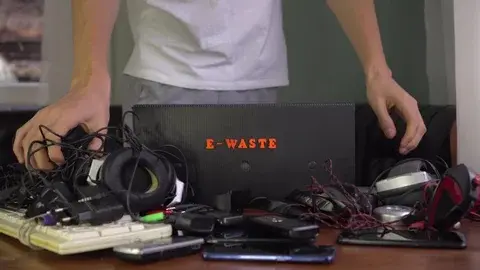E-waste poses risks, urging sustainable practices for PC startups. Managing responsibly includes recycling, refurbishing, and awareness. Understanding impact and implementing circular strategies are vital. Proper disposal minimizes negative effects, while eco-friendly procurement fosters sustainability. Tracking progress in reducing waste is crucial for a cleaner environment. Embracing these practices benefits the planet and drives tech businesses’ success. Let’s explore the environmental impact of electronic waste and its effects on our planet’s ecosystems.
Key Takeaways
- Implement effective e-waste recycling programs.
- Enforce extended producer responsibility laws.
- Promote sustainable product design initiatives.
- Educate consumers on responsible disposal.
- Collaborate for a cleaner environment in PC startup ventures.
Growing Concerns on E-Waste
The accumulation of electronic waste has become a pressing issue in today’s society. Concerns about its environmental impact and long-term sustainability are on the rise. To address this, effective recycling programs, extended producer responsibility laws, and sustainable product design initiatives are necessary. Collaborative efforts between manufacturers, consumers, and policymakers are vital in mitigating the negative effects of e-waste on the environment.
Understanding E-Waste Impact
The impact of electronic waste, or e-waste, is a pressing issue that demands attention because of the hazards it poses to both the environment and human health. Understanding the consequences of improperly disposed e-waste is essential in highlighting the urgent need for sustainable e-waste management practices. By delving into the environmental repercussions of e-waste and promoting responsible disposal methods, we can work towards mitigating the detrimental effects of this growing global concern.
E-Waste Hazards Overview
How do electronic waste hazards contribute to the environmental impact of discarded electronics? E-waste contains toxic substances like lead, mercury, and cadmium, which can contaminate soil and water sources, posing serious health risks to humans and wildlife. Improper disposal methods, such as incineration or landfilling, can release these harmful chemicals into the environment, emphasizing the urgent need for proper e-waste management strategies in sustainable business practices.
Environmental Consequences of E-Waste
Understanding the significant environmental consequences of electronic waste is imperative for developing effective and sustainable e-waste management practices. E-waste impact includes:
- Soil contamination from toxic materials.
- Air pollution because of incineration.
- Water pollution from leaching chemicals.
- Health risks for humans and wildlife.
Addressing these consequences is essential for nurturing a cleaner and safer environment for all.
Sustainable E-Waste Management
Discussing the sustainable management of electronic waste involves a thorough understanding of its environmental impact and the necessary measures to ease its consequences. Implementing proper e-waste management practices such as recycling, refurbishing, and proper disposal can significantly reduce the negative effects on the environment. Moreover, raising awareness among consumers about the importance of responsible electronic waste disposal is critical in promoting a sustainable approach to e-waste management.
E-Waste Challenges in PC Startups
Exploring the realm of Personal Computer startups presents a multitude of electronic waste challenges that demand strategic solutions and proactive measures for sustainable business practices.
- Limited Resources: Startups often lack the infrastructure for proper e-waste disposal.
- Fast Technological Obsolescence: Rapid advancements lead to a higher turnover of electronic devices.
- Lack of Awareness: Many startups are unaware of the environmental impact of e-waste.
- Cost Constraints: Proper e-waste management can be financially burdensome for fledgling businesses.

Sustainable Practices for E-Waste Reduction
In addressing the challenges posed by electronic waste in personal computer startups, implementing sustainable practices for e-waste reduction is paramount to promoting environmentally responsible business operations. This includes strategies like refurbishing and recycling electronic components, adopting energy-efficient technologies, and educating consumers on proper e-waste disposal methods. By integrating these practices, PC startup ventures can contribute positively to reducing the environmental impact of electronic waste.
Implementing Circular Economy Strategies
To improve sustainability efforts and combat the environmental repercussions of electronic waste, the integration of circular economy strategies is vital for PC startup ventures.
- Product Life Extension: Repair and refurbish electronic devices to prolong their usability.
- Resource Recovery: Extract valuable materials from old electronics for reuse.
- Product-as-a-Service Models: Offer services instead of selling products outright.
- Collaborative Networks: Establish partnerships for sharing and reusing resources efficiently.
Responsible Disposal of Electronic Waste
A critical aspect in addressing the environmental impact of electronic waste involves implementing responsible disposal practices that prioritize recycling and proper handling of discarded electronics. Companies should partner with certified e-waste recyclers to guarantee that materials are processed ethically and sustainably. Implementing strict guidelines for the disposal of electronic waste helps reduce pollution, conserve resources, and promote a more sustainable approach to managing end-of-life electronics.
Eco-Friendly Procurement Practices
Eco-friendly procurement practices play an essential role in mitigating the environmental impact of electronic waste. Implementing sustainable supply chain strategies and sourcing products from green suppliers are key initiatives that can significantly reduce the ecological footprint of electronic devices. By prioritizing eco-friendly procurement practices, businesses can contribute to a more sustainable and environmentally conscious approach to dealing with electronic waste.
Sustainable Supply Chain
Implementing sustainable supply chain practices is essential for reducing the environmental impact of electronic waste in the procurement process.
- 1. Source materials from environmentally friendly suppliers.
- 2. Reduce packaging waste by opting for minimal and recyclable packaging.
- 3. Opt for energy-saving transportation methods.
- 4. Implement proper disposal and recycling methods for electronic components.
Green Product Sourcing
Sourcing environmentally mindful products is important in minimizing the ecological footprint of electronic waste within the procurement process. By opting for green product sourcing practices, PC startup ventures can reduce the environmental impact of their operations. This involves selecting suppliers that prioritize sustainable materials, energy-efficient production processes, and recyclable packaging. Embracing eco-friendly procurement practices can lead to a more sustainable supply chain and contribute to a healthier planet.
Encouraging E-Waste Recycling Programs
Promoting the adoption of e-waste recycling programs is vital for lessening the environmental impact of electronic waste in today’s digital era.
- Collaborate with local recycling centers to provide convenient drop-off locations.
- Offer incentives such as discounts on future purchases for customers who recycle their old electronics.
- Educate consumers about the importance of responsible e-waste disposal through marketing campaigns.
- Partner with e-waste recycling organizations to guarantee proper handling and disposal of electronic waste.
Tracking E-Waste Reduction Progress
Progress in reducing electronic waste can be effectively monitored through all-encompassing tracking systems that capture disposal and recycling data. By implementing detailed tracking mechanisms, businesses can closely monitor their e-waste reduction progress, identify areas for improvement, and set achievable goals. These systems provide valuable insights into waste generation patterns, recycling rates, and the overall effectiveness of sustainability initiatives within PC startup ventures.
Frequently Asked Questions
How Can PC Startup Ventures Effectively Track Their Progress in Reducing Electronic Waste?
PC startup ventures can effectively track their progress in reducing electronic waste by implementing waste tracking software, conducting regular waste audits, setting clear waste reduction goals, and creating a culture of sustainability awareness among employees.
What Are Some Eco-Friendly Procurement Practices That Can Be Implemented to Reduce Electronic Waste in PC Startups?
Implementing eco-friendly procuraŠent practices, such as buying refurbished equipŠent, using recyclable packaging, and choosing suppliers with sustainability certifications, can reduce electronic waste in PC startups. These practices align with environŠental responsibility and cost-effectiveness.
How Can PC Startup Ventures Encourage E-Waste Recycling Programs Within Their Organizations?
PC startup ventures can encourage electronic waste recycling programs by partnering with certified electronic waste recyclers, implementing employee training on proper disposal methods, incentivizing recycling efforts, and setting up collection points within the organization. Such initiatives promote sustainability and environmental responsibility.
What Are Some Challenges Specific to Electronic Waste in PC Startup Ventures That Need to Be Addressed?
Challenges specific to electronic waste in Personal Computer startup ventures include limited resources for proper disposal, lack of awareness on sustainable practices, and the need for cost-effective recycling solutions. Addressing these challenges is essential for nurturing a greener business environment.
How Can Circular Economy Strategies Be Effectively Implemented to Reduce Electronic Waste in PC Startup Ventures?
Circular economy strategies can effectively reduce electronic waste in PC startup ventures by emphasizing product design for longevity, implementing take-back programs for recycling, and promoting the reuse of components. Prioritizing sustainability can lead to cost savings and environmental benefits.
Conclusion
In summary, the environmental impact of electronic waste poses significant challenges for PC startup ventures. By implementing sustainable business practices such as circular economy strategies, responsible disposal of electronic waste, eco-friendly procurement practices, and encouraging e-waste recycling programs, companies can actively reduce their ecological footprint and contribute to a more sustainable future. It is essential for businesses to track their progress in e-waste reduction to guarantee continuous improvement and alignment with eco-friendly principles.
You may also like to read:






